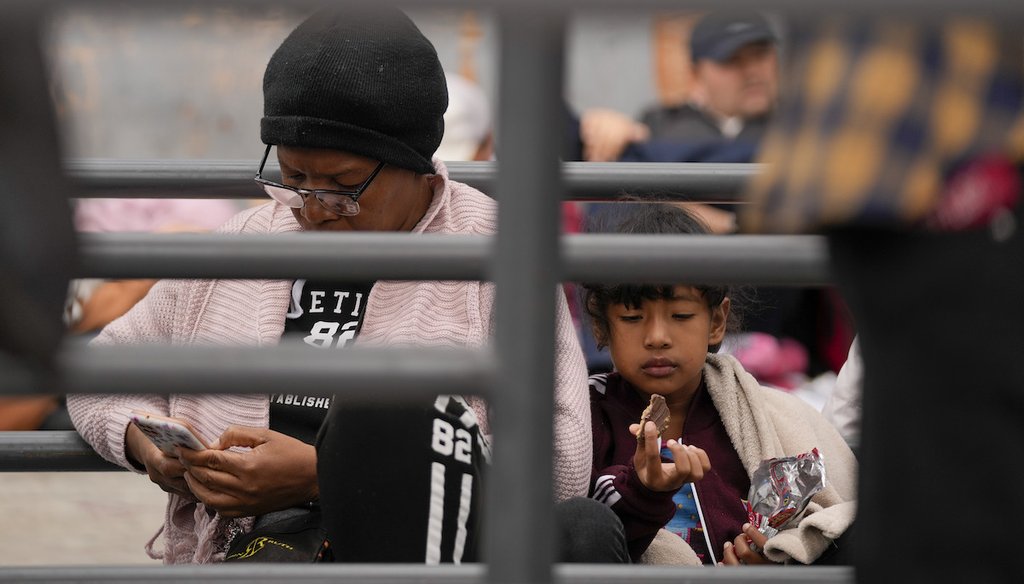Stand up for the facts!
Our only agenda is to publish the truth so you can be an informed participant in democracy.
We need your help.
I would like to contribute

A woman looks at her phone as she waits with others to apply for asylum near the pedestrian entrance to the San Isidro Port of Entry, linking Tijuana, Mexico with San Diego, June 1, 2023, in Tijuana, Mexico. (AP)
Before making the arduous journey from their home countries toward the U.S. in search of a better life, migrants usually resort to the internet, social media and applications like WhatsApp to inform themselves on how to reach their final destination.
They seek information via social media because they are "focused on the safe way, or the fastest way, or the easiest way to get to the United States," said Guadalupe Correa-Cabrera, an immigration expert at George Mason University. "They are constantly checking" social media.
However, immigration policies are complicated and have changed a lot in the last few years. As a result, understanding the legal process to reach the United States has become increasingly difficult. This breeds misinformation.
"In normal conditions, people would not believe certain things," said Fernando García, executive director of Border Network for Human Rights, an organization that supports migrants in El Paso, Texas. "But they are living in shock and fear every day. And they are very susceptible to anything that comes through that would give them a certain degree of hope."
Not all information that is shared on social media is wrong; still, there are various accounts on social media with hundreds of thousands of followers that share false or misleading information.
Sign up for PolitiFact texts
Correa-Cabrera said disinformation narratives often begin via WhatsApp and are then complemented and amplified on social media platforms such as Instagram or TikTok.
"These influencers look like people that know about immigration law, even though they don't," Correa-Cabrera said. "Sometimes they present themselves as if they are lawyers. And this is kind of the image that they want to portray."
This gives migrants more confidence that the information they’re seeing is accurate, even when it’s not.
For example, Dario Andres Oviedo Melendez and Jose Rafael Roman Argotte have Facebook, Instagram, YouTube and TikTok accounts with more than 950,000 followers combined. They post daily videos in Spanish providing updates on U.S. immigration policies. We don’t know what Oviedo Melendez and Roman Argotte’s intentions are, but the information they provide is not always correct.
On April 9, Roman Argotte posted a video on TikTok, that has nearly 400,000 views, informing his followers that from that day forward "Venezuelans could not be expelled to Mexico using Title 42." He cites as the source an article from the right-wing website Breitbart. Title 42, a public health policy that expired May 11, allowed border officials to quickly expel people arriving at the southern border, without the possibility of seeking asylum.
Watch on TikTok
At the time, there was no official announcement that Venezuelans would be exempt from the policy. A day after Roman Artgotte posted the video, hundreds of migrants rushed to the border between Mexico and the United States with false hopes that they could enter the United States.
"On social media, on TikTok, Instagram, Facebook the news is spreading," that people can surrender themselves to U.S. authorities to seek asylum, a Venezuelan migrant told a reporter in Spanish at the border April 10.
That same day, U.S. Customs and Border Protection tweeted that the information was false. The Department of Homeland Security also told PolitiFact that Roman Argotte’s claim was incorrect.
Nothing Has Changed: Despite media reports, social media posts to the contrary, an appointment via the CBP One app is still required for Title 42 exception processing at ports of entry. Read more here: https://t.co/Dqpr34kulF pic.twitter.com/qs5iphUxQj
— CBP South Texas (@CBPSouthTexas) April 10, 2023
PolitiFact tried to contact both influencers via messages on WhatsApp, TikTok, Instagram, and by calling them, but did not get a response. However, days after PolitiFact reached out to Roman Argotte, he posted three videos on TiKTok about misinformation on social media. In the videos, Roman Argotte directly mentions the examples PolitiFact outlined in its messages.
Speaking about his April 9 video, Roman Argotte said that at the time, the information he provided was "truthful" and "accurate," and that "many people incorrectly shared the message."
Commonly, content creators on social media use changes in U.S. immigration policies to "provide the sense of urgency," Correa-Cabrera said. People create posts that include partial truths and present the asylum and refugee processes as simple and quick.
"From May 11 on, people reaching the border will not be able to be deported under Title 42," said Roman Argotte in one of his most popular TikTok videos that has 17.6 million views.
Watch on TikTok
PolitiFact rated this claim Mostly False; migrants won’t be expelled under Title 42, because the policy is no longer in force, but that does not mean that any migrant can enter the country, like the video suggests.
On June 19, Roman Argotte said on TikTok that the misinformation in that video was "the fault of people who did not understand its message and shared it."
Oviedo Melendez, one of the content creators, told his followers in March that Biden had "announced in a statement that Ecuadorians could legally come to the U.S. through a new refugee program."
The Homeland Security department told PolitiFact this information was false.
In addition to creating content on social media, Roman Argotte’s TikTok account says he provides "legal consultations" via WhatsApp.
On his Instagram account, Oviedo Melendez said he provides "legal advice" and he calls himself a "lawyer specialized" in immigration and charges $20 for a 15-minute consult, according to an automatic response from his WhatsApp account.
When people comment on Oviedo Melendez’ and Roman Argotte’s Instagram and TikTok accounts asking for more information or clarifications, they respond that consults must be done via WhatsApp.
Both creators have a company registered in Florida called Dario Pfister LLC, but neither appears to be registered as a lawyer in the United States, according to a PolitiFact search.
Misinformation on social media partly influences people’s decisions on how and when to cross the Mexico-U.S. border, said García from the Border Network for Human Rights.
"There are important push and pull factors," he said. "But somehow, what solidifies the decision is disinformation."
Data-Pop Alliance’s Anna Spinardi and Berenice Fernández contributed to this report.
This story was produced with the support of the International Center for Journalists’ Disarming Disinformation program, a three-year global effort with lead funding from the Scripps Howard Fund.
Our Sources
Phone interview, Guadalupe Correa-Cabrera, associate professor at George Mason University, June 20, 202
Phone interview, Fernando García, executive director of Border Network for Human Rights, June 22, 2023
Tech Transparency Project, Inside the world of misinformation targeting migrants on social media, June 26, 2022
Breitbart, Exclusive: Biden admin stops Title 42 expulsions for Venezuelan migrants in two Texas border sectors, April 7, 2023
PolitiFact, Title 42 expiration: What's next for migrants applying for asylum at US’ southern border?, May 8
Agence France-Presse News Agency, Migrants rush to US-Mexico bridge prompting temporary border closure | AFP, April 11, 2023
PolitiFact, Deportation didn’t end with Title 42’s expiration; immigration law still stands, May 16, 2023
Florida Division of Corporations, Florida Limited Liability Co., accessed June 28, 2023


































